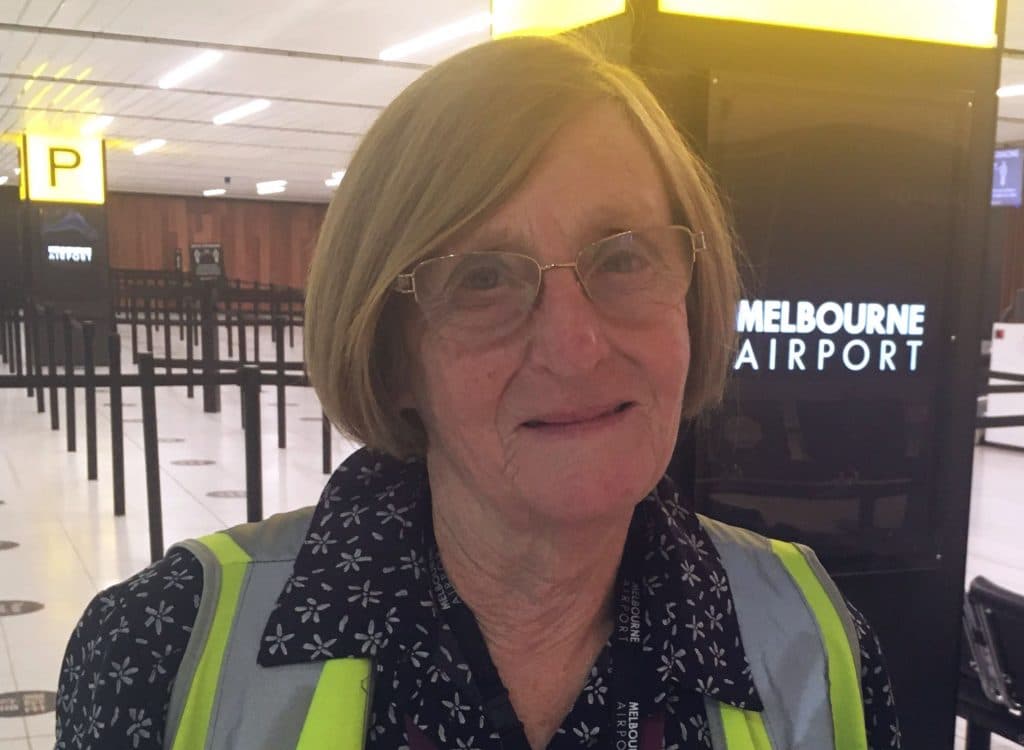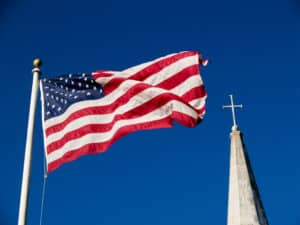
Jenan Taylor
10 November 2022
Melbourne Airport chaplain Mary Holloway thought there was something not quite right about the woman sitting by herself near the ticket counter.
The woman didn’t seem upset and gave no signs of wanting to communicate, so Ms Holloway continued about her business, roaming the concourse of terminal two.
She had just returned to the chaplaincy office when the ticket staff called. The woman was severely agitated, but because she had noticed Ms Holloway earlier, she specifically wanted her help.
In the excited buzz of people going on holidays, the woman was one of many passengers who were not there for happy reasons.
“A lot of people will travel for very sad and very complex reasons. And often they will be quite traumatised because of that,” Ms Holloway said.
Ms Holloway is one of six chaplains in a multifaith team who wander Melbourne International Airport in high-vis vests.
Most days more than 100,000 souls pass through its doors and the chaplains’ job is to keep an eye on them.
A lay minister at Westmeadows-Bulla Anglican parish, Ms Holloway has been a volunteer at Melbourne Airport since 2009, giving emotional and spiritual support to passengers, airport workers and airline staff.
Because airports tend to be so complex, often chaplains offer much more.
Read more: A NSW priest wants Melbourne chaplains to go to the races. Here’s why.
They are the first responders when there are emergencies in the air and on the ground, offering consolation to families and staff.
In any one week they could be holding the hand of someone who’s collapsed with a heart attack, mediating at check-in counters for people who have missed a flight they needed to be on, or helping the elderly and people with disabilities navigate comfortably through the concourse.
Dealing with social justice issues such as human trafficking, has become a more regular part of their repertoire.
Ms Holloway recalled a recent incident when a boy arrived alone from Malaysia.
He told Border Force Immigration that he had a visa for a holiday and was going to work. But it turned out that he’d been sold by his parents to a Melbourne supermarket. They hoped he’d make enough to help the family back home survive.
He was underage at 17, so the Border Force officials sent for the airport chaplain.
“Especially if there’s an underage person, we’ll be asked to sit in as a neutral person to guard their rights and look after them and make sure everything’s fine,” Ms Holloway said.
Coordinating chaplain Captain Martyn Scrimshaw has been in the role for five years, after spending 25 years in ministry with The Salvation Army and Victoria Police.
He said it wasn’t unusual for his team to have about 130 to 140 significant conversations a month with people seeking support or advice.
Many were fleeing domestic violence or experiencing homelessness.
“The airport is warm, dry and always open, so we do have our fair share of rough sleepers,” Mr Scrimshaw said. “If after a few days they’re still there, staff tend to notice, and we’ll do a welfare check, and see if we can refer them to an appropriate service.”
He recalled one person who would leave the airport by bus first thing every morning, and return late afternoon to set up a spot in the waiting lounges. He believes the person spent the day at a local shopping centre.
“The staff and a few passengers were pretty amazing, buying him coffees and food. He wasn’t creating a nuisance, but eventually we put some processes in place to help him out,” Mr Scrimshaw said.
The COVID-19 pandemic lockdowns brought both challenges and opportunities for the team.
The airport was still operating, but it was a time of high anxiety because people were being made redundant and there were also lots of personal issues, Mr Scrimshaw said.
On the other hand because of the quieter environment, the team was able to have deeper conversations with the airport workforce and build closer relationships with them.
Because of that they were able to get a better view of what chaplains did, he said.
Read more: Collingwood minister’s army chaplaincy work recognised
In recent months, the team has been there to help calm passengers, as queues snaked around under-staffed check-in counters. In June, a metropolitan newspaper captured them helping to process passengers’ bags.
Despite similar pressures and needs at airports throughout Australia, Mr Scrimshaw said Melbourne and Hobart are the only two airports with a chaplaincy team.
Melbourne Airport chief of aviation Jim Parashos regards them as essential staff who provide valuable support.
He said for those in crisis, they were the face of hope.
Ms Holloway is grateful the chaplains are supported to spend the day walking and talking to people. She said chaplains were not personally allowed to initiate religious discussions, but if people introduced spiritual matters, they were able to have those conversations.
That happens frequently for both Ms Holloway and Mr Martyn.
They agreed that they have had more spiritual discussions with people in the airport than in the whole of their careers in ministry.
For that reason, Ms Holloway believes she is right where God has always wanted her to be. She has never felt inclined towards ordination, but instead loves where she is.
She only has to think of the silent lady at the ticket counter who turned out to be in desperate need, to know she has made the right choice.
“It was a God moment. I could have turned left, I could have turned right. But something directed me instead to that ticket counter that day and gave that person and me the opportunity to make a connection.”
For more faith news, follow The Melbourne Anglican on Facebook, Twitter, or subscribe to our weekly emails.







